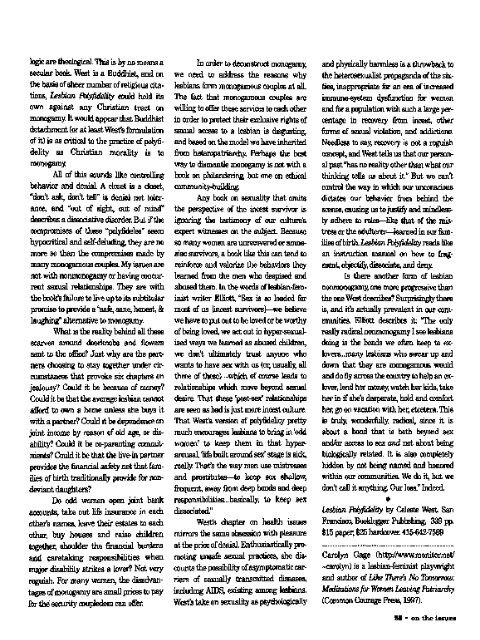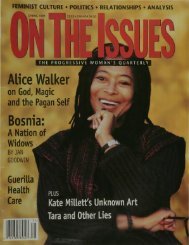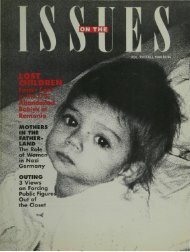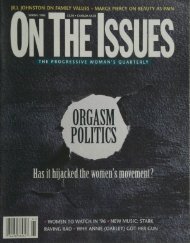women histories, incest sexual abuse. institutionalized. But what if ...
women histories, incest sexual abuse. institutionalized. But what if ...
women histories, incest sexual abuse. institutionalized. But what if ...
Create successful ePaper yourself
Turn your PDF publications into a flip-book with our unique Google optimized e-Paper software.
logic are theological. This is by no means a<br />
secular book. West is a Buddhist, and on<br />
the basis of sheer number of religious citations,<br />
Lesbian Polyfidelity could hold its<br />
own against any Christian tract on<br />
monogamy. It would appear that Buddhist<br />
detachment (or at least West's formulation<br />
of it) is as critical to the practice of polyfidelity<br />
as Christian morality is to<br />
monogamy.<br />
All of this sounds like controlling<br />
behavior and denial. A closet is a closet,<br />
"don't ask, don't tell" is denial not tolerance,<br />
and "out of sight, out of mind"<br />
describes a dissociative disorder. <strong>But</strong> <strong>if</strong> the<br />
compromises of these "polyfideles" seem<br />
hypocritical and self-deluding, they are no<br />
more so than the compromises made by<br />
many monogamous couples. My issues are<br />
not with nonmonogamy or having concurrent<br />
<strong>sexual</strong> relationships. They are with<br />
the book's failure to live up to its subtitular<br />
promise to provide a "safe, sane, honest, &<br />
laughing" alternative to monogamy<br />
What is the reality behind all these<br />
scarves around doorknobs and flowers<br />
sent to the office? Just why are the partners<br />
choosing to stay together under circumstances<br />
that provoke six chapters on<br />
jealousy? Could it be because of money?<br />
Could it be that the average lesbian cannot<br />
afford to own a home unless she buys it<br />
with a partner? Could it be dependence on<br />
joint income by reason of old age, or disability?<br />
Could it be co-parenting commitments?<br />
Could it be that the live-in partner<br />
provides the financial safety net that families<br />
of birth traditionally provide for nondeviant<br />
daughters?<br />
Do odd <strong>women</strong> open joint bank<br />
accounts, take out l<strong>if</strong>e insurance in each<br />
other's names, leave their estates to each<br />
other, buy houses and raise children<br />
together, shoulder the financial burdens<br />
and caretaking responsibilities when<br />
major disability strikes a lover? Not very<br />
roguish. For many <strong>women</strong>, the disadvantages<br />
of monogamy are small prices to pay<br />
for the security coupledom can offer.<br />
In order to deconstruct monogamy,<br />
we need to address the reasons why<br />
lesbians form monogamous couples at all.<br />
The fact that monogamous couples are<br />
willing to offer these services to each other<br />
in order to protect their exclusive rights of<br />
<strong>sexual</strong> access to a lesbian is disgusting,<br />
and based on the model we have inherited<br />
from heteropatriarchy. Perhaps the best<br />
way to dismantle monogamy is not with a<br />
book on philandering, but one on ethical<br />
community-building.<br />
Any book on <strong>sexual</strong>ity that omits<br />
the perspective of the <strong>incest</strong> survivor is<br />
ignoring the testimony of our culture's<br />
expert witnesses on the subject. Because<br />
so many <strong>women</strong> are unrecovered or amnesiac<br />
survivors, a book like this can tend to<br />
reinforce and valorize the behaviors they<br />
learned from the men who despised and<br />
<strong>abuse</strong>d them. In the words of lesbian-feminist<br />
writer Elliott, "Sex is so loaded for<br />
most of us [<strong>incest</strong> survivors]—we believe<br />
we have to put out to be loved or be worthy<br />
of being loved, we act out in hyper-<strong>sexual</strong>ized<br />
ways we learned as <strong>abuse</strong>d children,<br />
we don't ultimately trust anyone who<br />
wants to have sex with us (or, usually, all<br />
three of these)—which of course leads to<br />
relationships which move beyond <strong>sexual</strong><br />
desire. That these 'post-sex 1 relationships<br />
are seen as bad is just more <strong>incest</strong> culture.<br />
That West's version of polyfidelity pretty<br />
much encourages lesbians to bring in 'odd<br />
<strong>women</strong>' to keep them in that hyperarousal,<br />
l<strong>if</strong>e built around sex 1 stage is sick,<br />
really. That's the way men use mistresses<br />
and prostitutes—to keep sex shallow,<br />
frequent, away from deep bonds and deep<br />
responsibilities...basically, to keep sex<br />
dissociated."<br />
Wesfs chapter on health issues<br />
mirrors the same obsession with pleasure<br />
at the price of denial. Enthusiastically promoting<br />
unsafe <strong>sexual</strong> practices, she discounts<br />
the possibility of asymptomatic carriers<br />
of <strong>sexual</strong>ly transmitted diseases,<br />
including AIDS, existing among lesbians.<br />
West's take on <strong>sexual</strong>ity as psychologically<br />
and physically harmless is a throwback to<br />
the hetero<strong>sexual</strong>ist propaganda of the sixties,<br />
inappropriate for an era of increased<br />
immune-system dysfunction for <strong>women</strong><br />
and for a population with such a large percentage<br />
in recovery from <strong>incest</strong>, other<br />
forms of <strong>sexual</strong> violation, and addictions.<br />
Needless to say, recovery is not a roguish<br />
concept, and West tells us that our personal<br />
past "has no reality other than <strong>what</strong> our<br />
thinking tells us about it." <strong>But</strong> we can't<br />
control the way in which our unconscious<br />
dictates our behavior from behind the<br />
scenes, causing us to just<strong>if</strong>y and mindlessly<br />
adhere to roles—like that of the mistress<br />
or the adulterer—learned in our families<br />
of birth. Lesbian Polyfidelity reads like<br />
an instruction manual on how to fragment,<br />
object<strong>if</strong>y, dissociate, and deny.<br />
Is there another form of lesbian<br />
nonmonogamy, one more progressive than<br />
the one West describes? Surprisingly there<br />
is, and <strong>if</strong>s actually prevalent in our communities.<br />
Elliott describes it: "The only<br />
really radical nonmonogamy I see lesbians<br />
doing is the bonds we often keep to exlovers...many<br />
lesbians who swear up and<br />
down that they are monogamous would<br />
and do fly across the country to help an exlover,<br />
lend her money, watch her kids, take<br />
her in <strong>if</strong> she's desperate, hold and comfort<br />
her, go on vacation with her, etcetera. This<br />
is truly, wonderfully, radical, since it is<br />
about a bond that is both beyond sex<br />
and/or access to sex and not about being<br />
biologically related. It is also completely<br />
hidden by not being named and honored<br />
within our communities. We do it, but we<br />
don't call it anything. Our loss." Indeed.<br />
•<br />
Lesbian Polyfidelity by Celeste West. San<br />
Francisco, Booklegger Publishing, 339 pp.<br />
$15 paper; $25 hardcover. 415-642-7569<br />
Carolyn Gage (http://www.monitor.net/<br />
-carolyn) is a lesbian-feminist playwright<br />
and author cfiLike There's No Tomorrow:<br />
Meditations for Women Leaving Patriarchy<br />
(Common Courage Press, 1997).<br />
55 - on the issues

















